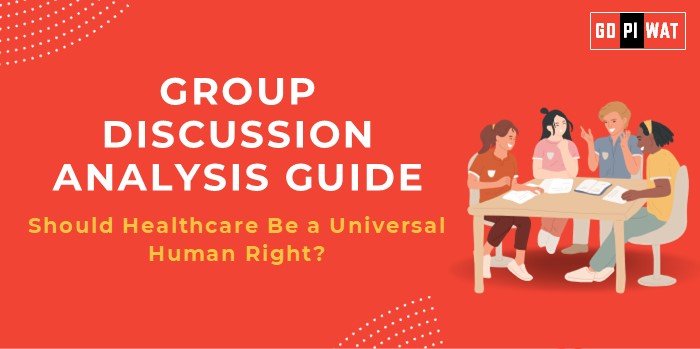📋 Group Discussion Analysis Guide: Should Healthcare Be a Universal Human Right?
🌐 Introduction to the Topic
Opening Context: “Healthcare is a fundamental necessity, yet access remains unequal across countries and social strata. The debate over healthcare as a universal human right continues to shape global policies and ethical frameworks.”
Topic Background: The notion of universal healthcare stems from the Universal Declaration of Human Rights (1948), which recognizes health as a fundamental right. Despite advancements in medicine, significant disparities exist in healthcare access, quality, and affordability.
📊 Quick Facts and Key Statistics
- 💰 Global Healthcare Spending: $8.5 trillion in 2023, yet 30% of the world lacks access to essential services (WHO).
- 📈 Life Expectancy Gap: A 20-year difference between high-income and low-income nations (World Bank).
- 💸 Out-of-Pocket Expenditure: 17% globally; as high as 60% in some low-income countries.
- 🌍 Universal Healthcare Systems: Adopted in 70+ countries, covering over 90% of their populations.
👥 Stakeholders and Their Roles
- Governments: Formulate policies, allocate budgets, and regulate healthcare services.
- Private Sector: Innovates and provides supplemental healthcare services.
- International Organizations: WHO and UN advocate for universal health coverage (UHC).
- Citizens: Demand equity and support policy changes.
- Non-Governmental Organizations (NGOs): Address healthcare gaps in underserved areas.
🏆 Achievements and Challenges
- Achievements:
- WHO Universal Health Coverage Initiative: Coverage extended to 1 billion more people since 2000.
- India’s Ayushman Bharat: Provides coverage to 500 million people.
- Nordic Models: Exhibit near-perfect access to healthcare with minimal disparity.
- Challenges:
- Healthcare Inequity: Significant gaps in low-income countries.
- Cost Barriers: High treatment costs lead to financial crises for millions annually.
- Global Comparison: Countries like the US struggle with high costs despite advanced systems, unlike Cuba, where universal healthcare is provided at low costs.
💬 Structured Arguments for Discussion
- Supporting Stance: “Access to healthcare as a human right ensures equity and enhances societal well-being.”
- Opposing Stance: “Universal healthcare strains economies and may lower quality standards due to resource dilution.”
- Balanced Perspective: “Healthcare as a human right is achievable but requires tailored policies addressing fiscal and infrastructural challenges.”
💡 Effective Discussion Approaches
- Opening Approaches:
- 📊 Statistical Start: “With 30% of the global population lacking essential healthcare, the need for universal access is evident.”
- 🌍 Contrast Start: “While Norway achieves near-universal coverage, 60% of healthcare in sub-Saharan Africa is out-of-pocket.”
- Counter-Argument Handling:
- “While costs are a concern, strategic public-private partnerships can alleviate economic strain.”
- “Inclusion does not mean uniformity; adaptable models ensure sustainability.”
🔍 Strategic Analysis of Strengths and Weaknesses
- Strengths: Enhanced productivity with healthier populations; reduced economic disparities.
- Weaknesses: High implementation costs; potential overburdening of public systems.
- Opportunities: Leveraging AI and telemedicine for low-cost, wide-reaching solutions.
- Threats: Resistance from private sectors fearing profit loss.
📚 Connecting with B-School Applications
- Real-World Applications: Research on UHC implementation models; analyzing healthcare financing for economic sustainability.
- Sample Interview Questions:
- “How does healthcare as a human right influence economic policies?”
- “What lessons can emerging markets learn from developed nations?”
- Insights for Students:
- Focus on financial and operational efficiencies in healthcare systems.
- Explore healthcare technology as a growth domain.


